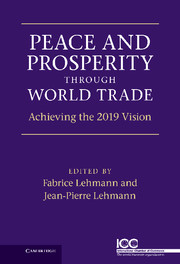Book contents
- Frontmatter
- Contents
- Notes on contributors
- Foreword
- Preface: the ICC vision
- Historical overview and dynamics
- Editorial note
- A Global systemic transformations
- B Governance of global trade
- Editorial introduction
- B1 Securing the global trade regime: the demand for global governance
- B2 The trade regime and the future of the WTO
- B3 WTO reform: the time to start is now
- B4 ‘Murky protectionism’ and the WTO
- B5 Preferential trade agreements: imagining a world with less discrimination
- B6 The G-20 after the Great Recession: rebalancing trade
- B7 The missing piece: global imbalances and the exchange rate regime
- B8 Trading knowledge fairly: intellectual property rules for global prosperity and environmental sustainability
- B9 Trade and subsidies: undermining the trading system with public funds
- B10 Trading labour: a dilemma for migration regimes
- C Poverty and global inequities
- D The long view on interlocking crises
- E Global business responsibilities
- Conclusion: the imperative of inclusive global growth
- Index
B3 - WTO reform: the time to start is now
Published online by Cambridge University Press: 05 July 2011
- Frontmatter
- Contents
- Notes on contributors
- Foreword
- Preface: the ICC vision
- Historical overview and dynamics
- Editorial note
- A Global systemic transformations
- B Governance of global trade
- Editorial introduction
- B1 Securing the global trade regime: the demand for global governance
- B2 The trade regime and the future of the WTO
- B3 WTO reform: the time to start is now
- B4 ‘Murky protectionism’ and the WTO
- B5 Preferential trade agreements: imagining a world with less discrimination
- B6 The G-20 after the Great Recession: rebalancing trade
- B7 The missing piece: global imbalances and the exchange rate regime
- B8 Trading knowledge fairly: intellectual property rules for global prosperity and environmental sustainability
- B9 Trade and subsidies: undermining the trading system with public funds
- B10 Trading labour: a dilemma for migration regimes
- C Poverty and global inequities
- D The long view on interlocking crises
- E Global business responsibilities
- Conclusion: the imperative of inclusive global growth
- Index
Summary
The WTO is an essential plank of globalization. Imperfect and incomplete as WTO disciplines are, they provide a degree of predictability and stability to trade relations, the value of which has been brought home yet again by the 2008–2009 financial crisis. In a world of sluggish growth and burgeoning protectionist pressures, the importance of rules increases and the need to tighten them becomes more urgent.
The need for reform
However, to a worrying degree, the WTO is today living off the gains of its predecessor, the GATT system. In crucial aspects of its traditional mission, namely reducing actual and bound (i.e. maximum allowable) tariffs, the institution has become increasingly ineffectual. No new trade liberalization in goods and no new lowering of bound tariffs have been agreed under multilateral negotiations since the Uruguay Round concluded in 1994.
In newer areas, such as cutting agricultural subsidies and opening up the markets for services trade, the WTO has so far failed to deliver on its promise. Sluggish WTO negotiations have been overtaken and sidelined by unilateral (i.e. autonomous) liberalization as well as bilateral and regional processes.
Though the Doha agenda is reduced to a shadow of what was launched in December 2001, its conclusion is critical to capturing the gains still on the table and to preserving the system's credibility. The G-8 meeting held in L'Aquila, Italy, in July 2009 called for a conclusion of the negotiations by the end of 2010, and given the long history of missed deadlines and the time needed for ratification, it is unlikely that implementation can begin before the end of 2011, the tenth anniversary of the start of the negotiations.
- Type
- Chapter
- Information
- Peace and Prosperity through World TradeAchieving the 2019 Vision, pp. 83 - 88Publisher: Cambridge University PressPrint publication year: 2010
- 3
- Cited by



